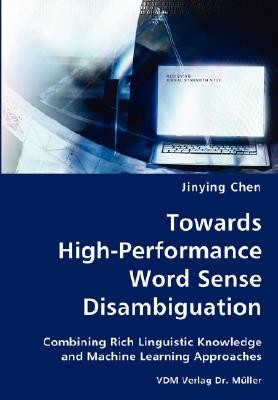
- We will send in 10–14 business days.
- Author: Jinying Chen
- Publisher: VDM Verlag Dr. Mueller E.K.
- ISBN-10: 3836427516
- ISBN-13: 9783836427517
- Format: 17 x 24.4 x 1 cm, softcover
- Language: English
- SAVE -10% with code: EXTRA
Towards High-Performance Word Sense Disambiguation- Combining Rich Linguistic Knowledge and Machine Learning Approaches (e-book) (used book) | bookbook.eu
Reviews
Description
Supervised word sense disambiguation (WSD) for truly polysemous words (in contrast to homonyms) is difficult for machine learning, mainly due to two problems: the lack of sense-tagged training data and the sparsity of the matrix of observed instances vs. features. At the same time, high accuracy is necessary for WSD to be beneficial for high-level applications, such as information retrieval, question answering, and machine translation. This work addresses the above two problems through combining rich linguistic knowledge and machine learning methods. First, it proposes and demonstrates empirically evidence that careful design and generation of linguistically motivated features help to alleviate the data sparseness inherent in WSD. A state-of-theart supervised system for verb sense disambiguation was introduced. Exploration in three specific aspects of feature generation was discussed and shown to elevate the system accuracy to top-level. It also shows the effectiveness of active learning in the creation of more labeled training data for supervised WSD - reducing the required training data by 1/2 to 3/4 when learning coarse-grained English verb senses. The book is addressed to researchers in Computer and Information Science and Computational Linguistics.
EXTRA 10 % discount with code: EXTRA
The promotion ends in 21d.00:43:17
The discount code is valid when purchasing from 10 €. Discounts do not stack.
- Author: Jinying Chen
- Publisher: VDM Verlag Dr. Mueller E.K.
- ISBN-10: 3836427516
- ISBN-13: 9783836427517
- Format: 17 x 24.4 x 1 cm, softcover
- Language: English English
Supervised word sense disambiguation (WSD) for truly polysemous words (in contrast to homonyms) is difficult for machine learning, mainly due to two problems: the lack of sense-tagged training data and the sparsity of the matrix of observed instances vs. features. At the same time, high accuracy is necessary for WSD to be beneficial for high-level applications, such as information retrieval, question answering, and machine translation. This work addresses the above two problems through combining rich linguistic knowledge and machine learning methods. First, it proposes and demonstrates empirically evidence that careful design and generation of linguistically motivated features help to alleviate the data sparseness inherent in WSD. A state-of-theart supervised system for verb sense disambiguation was introduced. Exploration in three specific aspects of feature generation was discussed and shown to elevate the system accuracy to top-level. It also shows the effectiveness of active learning in the creation of more labeled training data for supervised WSD - reducing the required training data by 1/2 to 3/4 when learning coarse-grained English verb senses. The book is addressed to researchers in Computer and Information Science and Computational Linguistics.


Reviews